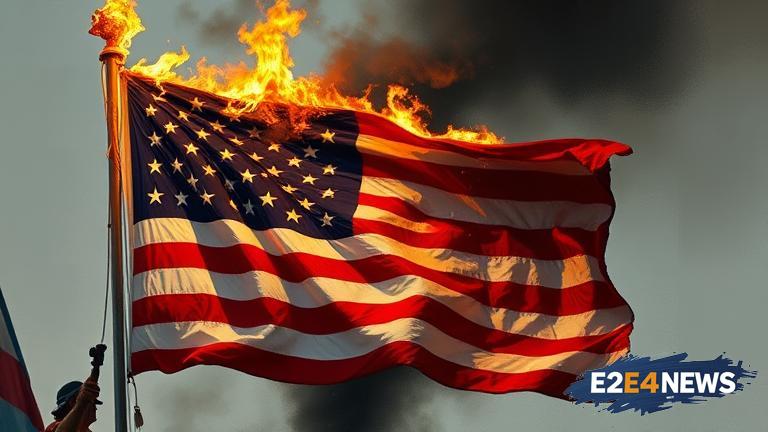The debate over flag burning has been a contentious issue in the United States for decades. Despite President Trump’s tough talk on the matter, the act of flag burning remains a form of protected speech under the First Amendment. The Supreme Court has consistently ruled that flag burning is a form of expression and is therefore protected by the Constitution. In the 1989 case of Texas v. Johnson, the court ruled that flag burning was a form of symbolic speech and was therefore protected. This ruling has been upheld in subsequent cases, including the 1990 case of United States v. Eichman. President Trump has previously spoken out against flag burning, calling it a ‘disgrace’ and suggesting that those who engage in the practice should face penalties. However, his administration has not taken any concrete steps to ban the practice. The American Civil Liberties Union (ACLU) has been a strong advocate for the right to free speech, including the right to burn flags. The organization has argued that the government should not be able to dictate what forms of expression are acceptable and what forms are not. The debate over flag burning is often contentious, with some arguing that it is a form of disrespect to the country and its symbols, while others see it as a form of protest and free speech. The issue has been particularly divisive in recent years, with some high-profile incidents of flag burning making headlines. Despite the controversy, the Supreme Court has consistently upheld the right to free speech, including the right to burn flags. The court has ruled that the government cannot prohibit the expression of ideas simply because they are unpopular or offensive. The First Amendment protects all forms of speech, including those that are considered unpopular or controversial. The right to free speech is a fundamental part of American democracy, and it is essential that it is protected and preserved. The debate over flag burning is likely to continue, with some arguing that it is a necessary form of protest and others arguing that it is a form of disrespect. However, the Supreme Court’s rulings on the matter are clear: flag burning is a form of protected speech and will continue to be so. The issue is not just about flag burning, but about the broader principles of free speech and expression. The government should not be able to dictate what forms of expression are acceptable and what forms are not. The ACLU and other civil liberties organizations will continue to advocate for the right to free speech, including the right to burn flags. The debate over flag burning is an important one, and it is essential that it is approached with a nuanced understanding of the issues at play. The Supreme Court’s rulings on the matter are clear, and it is essential that they are upheld. The right to free speech is a fundamental part of American democracy, and it is essential that it is protected and preserved. The government should not be able to prohibit the expression of ideas simply because they are unpopular or offensive. The First Amendment protects all forms of speech, including those that are considered unpopular or controversial. The issue of flag burning is complex and multifaceted, and it is essential that it is approached with a nuanced understanding of the issues at play. The debate over flag burning is likely to continue, with some arguing that it is a necessary form of protest and others arguing that it is a form of disrespect. However, the Supreme Court’s rulings on the matter are clear: flag burning is a form of protected speech and will continue to be so.
